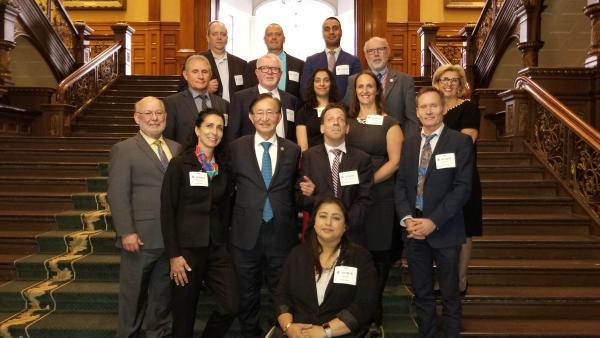On October 18, 2018 The Honourable Raymond Cho, Minister for Seniors and Accessibly, recognized National Disability Employment Awareness Month in his statement to the Legislative Assembly of Ontario. ODEN applauds Minister Cho and the Government of Ontario for their commitment to inclusive employment. This support, as well as that of Minister Lisa MacLeod of the Ministry of Children, Community and Social Services, helps ensure more Ontarians who have a disability have access to the workforce.

MINISTER RAYMOND CHO’S STATEMENT
Hon. Raymond Sung Joon Cho: I am honoured and privileged to rise in the Legislature today to acknowledge October as National Disability Employment Awareness Month.
Mr. Speaker, almost two million people in Ontario have a disability, and as our population ages, that number is only going to increase. In the last five years, it is also worth noting that about half a million Canadians with a disability have graduated with a post-secondary education, but they have found it very difficult to get a job. In fact, the unemployment rate for people with a disability is 16%—more than double Ontario’s unemployment rate—and two thirds of the people with a disability believe their disability is a factor in their unemployment. At the same time, almost 30% of small and medium-sized businesses struggle to fill job vacancies.
The math does not add up. A disability does not necessarily make someone unable to work. In fact, research shows that people with disabilities are great employees and often rank higher than their colleagues in many workplace evaluation categories. The bottom line is that every Ontarian should be able to work if they are capable and want to.
We often talk about how hiring someone with a disability is the right thing to do, but what we do not talk about is why it’s the right business decision. Over the years, there have been many outstanding leaders like Mark Wafer who have, through their tireless efforts―
Applause.
Hon. Raymond Sung Joon Cho: Thank you, Mr. Wafer―demonstrated business success when hiring those with disabilities.
People with disabilities are being hired across all sectors and they are bringing their exceptional talents and skills to their workplaces.
The facts bear this out, Mr. Speaker. Contrary to what many people believe, more and more employers are hiring people with a variety of disabilities, and those employees are staying with the company longer, they are more productive, and they have a higher workplace safety record. As a result, the stigma and those misconceptions are fading fast.
Banks are having success hiring people with autism in their fraud departments, noticing that people with autism can often spot patterns and problems with data that may otherwise go unnoticed.
There are so many examples that illustrate Ontario’s leadership. Look no further than the Ontario Disability Employment Network, a group led by Joe Dale—they are united to increase employment opportunities for people who have a disability—or the team at Magnet, a not-for-profit co-founded by the Ontario Chamber of Commerce and Ryerson University, which connects businesses and communities with new opportunities. For me, Magnet stands out because of its commitment to addressing the underemployment of people with disabilities and others who face barriers to employment.
I have personally seen this leadership in action as well. Mr. Speaker, in August I had the pleasure to visit Carleton University and take part in an exceptional tour organized by Larry McCloskey and his team at the Paul Menton Centre for Students with Disabilities. I came away impressed with Carleton’s expertise and commitment to create greater accessibility and a more inclusive world.
Among its many initiatives, I was introduced to the attendant and personal care services program for students in residence with disabilities. The program, which runs 24 hours a day, is the only one of its kind in Canada and gives students with disabilities who face barriers the opportunity to complete post-secondary education.
That’s why National Disability Employment Awareness Month is so important, because it gives us the opportunity to have important conversations to talk about disability and employment the way we need to. It gives us momentum to create an even more supportive employment culture in Ontario. I hope we all take advantage of October as National Disability Employment Awareness Month to think about how we can help break down the barriers, the stigma and the misconceptions about the people with disabilities.
In summary, our government is working hard to increase employment for all Ontarians, and that definitely includes people with disabilities, who want to work, because the success of one will trigger the success of many.
Mr. Speaker, we are advancing together, changing attitudes and achieving real change. Together, with leadership from every member in this House, we can one day live in a province where an awareness month will not even need to be celebrated.
Thank You.
-end-
View the video of Minister Cho’s speech in the Ontario Legislature October 18, 2018


